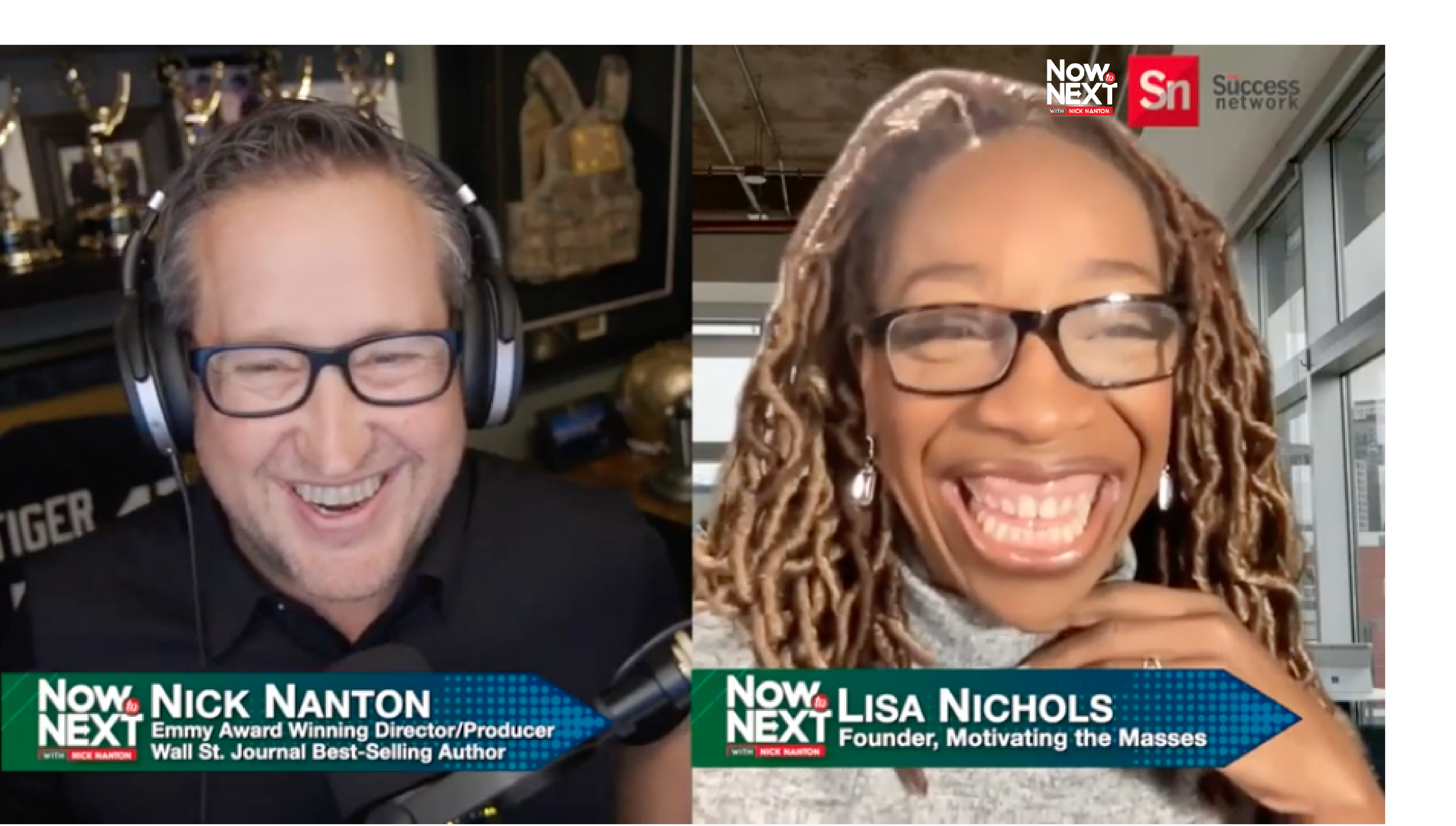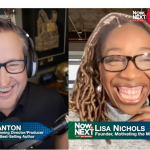Lisa Nichols is one of the world’s most-requested motivational speakers. She is the Founder and Chief Executive Officer of Motivating the Masses, a global platform that has reached and served nearly 80 million people through workshops and programs.
If you don’t know Lisa’s story, about 30 years ago, she was a struggling single mom on government assistance. Her breaking point came when she realized she didn’t have enough money in her bank account to buy diapers for her son. A determination was born inside of her, and one step after another, she transformed her life. Since then, her story and passion have motivated millions of people to find the courage to honor their untapped talents and infinite potential.
Author of six books including, Abundance Now, Lisa has been featured in films including The Secret, Dreamer, and her newest film co-written with Sean Smith and David Bianchi, Let’s Grow. Lisa joined my Now to Next podcast to discuss Let’s Grow and the community invitation it creates.
A Special Time in History
As I imagine it is true for many people who read my blog, I’m an empathetic person who does not judge people by skin color. Even so, the recent cultural conversation related to race has opened my eyes to perspectives I did not see before.
Lisa feels passionate that, to be successful, this cultural conversation cannot be accusatory or about making people “wrong.” If anyone walks away feeling guilty, ashamed, or embarrassed, we have failed to arrive at the real understanding these conversations can create and allow between people.
Sometimes what people are calling privilege is NOT having to worry about something. Let’s Grow is an invitation to an honest cross-cultural conversation about our experiences. It’s an opportunity to trust each other with the truth of our reality to increase understanding and empathy. Lisa, Sean (a white man), and David (a black man) wrote their parts from their direct life experience and perspectives.
For Sean, David, and many viewers, Let’s Grow is one of the first direct conversations on this difficult subject that is not about blame or shame and is not a battle about right and wrong.
Disagreement Is Okay
Let’s Grow is a 15-minute conversation between the three contributors. It opens with the two men, and Lisa joins them as a third perspective after a few minutes. The intent is to expand awareness while honoring each person’s dignity, which is a great way to approach any touchy subject.
In my work, I’ve sat across the table from controversial figures. When I share about any of these people, internet trolls seem to come out of the woodwork because they are polarizing figures. However, when you sit down with them person to person — I’ve never walked away not liking one of them. I leave thinking they are genuinely good human beings.
Whenever we think in generalities, white/black, republican/democrat, conservative/liberal, we make it easy to see a “them.” We can lose touch with the fact that these are everyday people with different life experiences and points of view from ours.
As Lisa points out, part of why this cultural conversation about race has been so charged is the depth of what is unspoken. When people of color are sharing in the realm of injustice or racism, they speak from deep-seated generational pain.
Anytime an emotion leads the conversation, we’re in danger of adding to the polarization instead of bridging it. A win-win conversation has a blend of emotion and logic, but logic has to lead.
The bottom line is when we respect each other’s viewpoint and are willing to listen, we can disagree and still be friends.
Environment Versus Desire
The influence of a hostile environment can be stronger than our desire. Some neighborhoods and communities work against a person’s success.
I often share that I grew up with more love than I could spend, but money was tight. However, I started with a base of strong support. Lisa grew up in a tough neighborhood and had to fight on her way home from school to stay out of the gangs. If she wouldn’t join, she had to fight them. Fortunately for her, her nuclear family motivated her to stay clean and live a better life.
Some environments, especially in economically disadvantaged areas, tear down people who make an effort to succeed. A person of any color who grows up in that culture can face grave fear if they venture out into corporate American or other areas of accomplishment and success. Their family and friends may try and invalidate or belittle them, but worse, their mindset can keep them in a trap of self-doubt or fear.
Conversations about mindset help us see past those imposed environmental limitations and discover greater freedom of choice.
Humans Require Progress
Even when it is challenging and messy, our job as change agents, as transformational leaders, individuals, fathers, and mothers is to poke the bear on behalf of what’s possible.
Let’s Grow is a movie with an invitation to a community event.
It’s hard to have a charged conversation and say everything right the first time. You have to get it all out on the table and begin to witness the other person’s context and points of view to expand into a new understanding.
It comes down to empathy — to how well we can compassionately see through the eyes of another. I’ve been working on a project with Chris Voss from Never Split the Difference. He says empathy is the biggest secret to living a great life.
We’re lucky because America is a place where a messy conversation like this can happen without being swept under the rug.
Create Intimate Proximity
When Lisa’s son was young, some friends invited them to Passover dinner. At the time, her son adored boiled eggs. During this very formal dinner at which they were the only African American people, Lisa was embarrassed to see her son eat egg after egg until the hostess leaned over and said, “You know, we are tired of the eggs. It is good to see someone enjoy them.”
They celebrated Passover with that family every year. This past year, Lisa’s son brought his new wife. While this tradition and the Jewish people might have remained a mystery to Lisa and her son, this intimate proximity with a family over time brought them into a sense of belonging that crosses cultural lines.
So, when we’re asking the question, “As global citizens, how can we make a difference?” The first big answer is creating intimate proximity. Read books and watch shows about other cultures. Invite new people into your circle. Try new foods and travel. Ask questions.
Let’s Grow is an invitation to create intimate proximity with people in your circle. It is a conversation-opener.
Diversity and Inclusion
If everyone looked the same, ate the same, and enjoyed the same activities, the world would be a monotonous, boring place. Growth happens at the intersection of the known and unknown, or as the boundary dissolves between “us” and “them.”
To participate in this conversation, Lisa, Sean, and David got started, download, and watch Let’s Grow. A virtual ticket is $4.75 and buys you unlimited playback for a month.
After you’ve processed the movie for yourself, the invitation is to create a watch party with a few friends. You can do it online and share your screen with everyone. After the movie and your discussion, invite your friends to buy a ticket and host a watch party themselves.
At the time of this interview, about 400 people have hosted a courageous cultural conversation online.
We don’t know what we don’t know, until we do. I invite you to check out Let’s Grow and discover what it opens up or bridges for you. Diversity is fundamental to human experience, growth, and happiness. Right now, in this country, we have an opportunity to see ourselves and people of other races in cultures in new and inclusive ways. I hope you join the discussion.
You can follow Lisa Nichols on Facebook or Instagram. And you can learn more about her and Let’s Grow by watching or listening to our full “Now to Next” episode on YouTube or your favorite podcasting platform. And, as always, you can direct any questions you have to me too.

